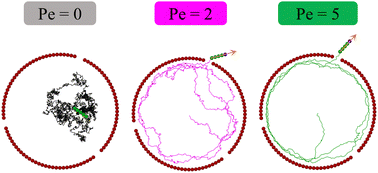Escape dynamics of a self-propelled nanorod from circular confinements with narrow openings†
Abstract
We perform computer simulations to explore the escape dynamics of a self-propelled (active) nanorod from circular confinements with narrow opening(s). Our results clearly demonstrate how the persistent and directed motion of the nanorod helps it to escape. Such escape events are absent if the nanorod is passive. To quantify the escape dynamics, we compute the radial probability density function (RPDF) and mean first escape time (MFET) and show how the activity is responsible for the bimodality of RPDF, which is clearly absent if the nanorod is passive. Broadening of displacement distributions with activity has also been observed. The computed mean first escape time decreases with activity. In contrast, the fluctuations of the first escape times vary in a non-monotonic way. This results in high values of the coefficient of variation and indicates the presence of multiple timescales in first escape time distributions and multimodality in uniformity index distributions. We hope our study will help in differentiating activity-driven escape dynamics from purely thermal passive diffusion in confinement.



 Please wait while we load your content...
Please wait while we load your content...